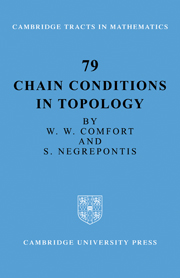Book contents
- Frontmatter
- Contents
- Introduction
- ERRATA
- Acknowledgements
- 1 Some infinitary combinatorics
- 2 Introducing the chain conditions
- 3 Chain conditions in products
- 4 Classes of calibres, using Σ-products
- 5 Calibres of compact spaces
- 6 Strictly positive measures
- 7 Between property (K) and the countable chain condition
- 8 Classes of compact-calibres, using spaces of ultrafilters
- 9 Pseudo-compactness numbers: examples
- 10 Continuous functions on product spaces
- Appendix: preliminaries
- References
- Subject index
- Index of symbols
5 - Calibres of compact spaces
Published online by Cambridge University Press: 05 November 2011
- Frontmatter
- Contents
- Introduction
- ERRATA
- Acknowledgements
- 1 Some infinitary combinatorics
- 2 Introducing the chain conditions
- 3 Chain conditions in products
- 4 Classes of calibres, using Σ-products
- 5 Calibres of compact spaces
- 6 Strictly positive measures
- 7 Between property (K) and the countable chain condition
- 8 Classes of compact-calibres, using spaces of ultrafilters
- 9 Pseudo-compactness numbers: examples
- 10 Continuous functions on product spaces
- Appendix: preliminaries
- References
- Subject index
- Index of symbols
Summary
In this chapter we study the calibres of compact spaces (and the precalibres of all spaces); the surprising fact is that an extensive class of cardinals, depending only on the Souslin number of the compact space in question, is a class of calibres for the space. This is the content of Theorems 5.6 and 5.25, the two main results of this section. (When the generalized continuum hypothesis is assumed, these results assume a particularly simple form, given in Corollary 5.26.) The techniques used for the proof of these results are combinatorial, and are contained in Lemmas 5.1 (a ramification method for regular cardinals), 5.4 (a method that deals with singular cardinals), and 5.22 (dealing with the ‘exceptional’ cardinals). It is noted that the combinatorial techniques used here involve ramification methods more general and more powerful than those given by the Erdős–Rado theorem on quasi-disjoint families of sets and its extension to singular cardinals; as to the determination of cardinal invariants, these latter results are useful essentially only for product spaces or for spaces with a product-like structure, while we in the present section are able to examine spaces quite general in nature. On the basis of examples given in Theorems 5.28 and 6.18, we can claim that the results are essentially all that can be proved for general spaces (see the diagrams in 7.19).
Information
- Type
- Chapter
- Information
- Chain Conditions in Topology , pp. 86 - 123Publisher: Cambridge University PressPrint publication year: 1982
